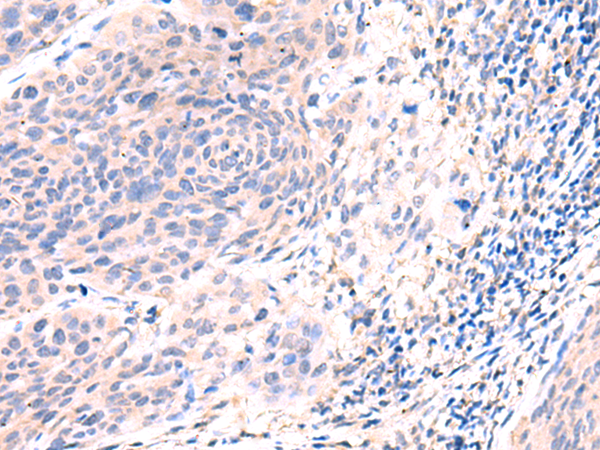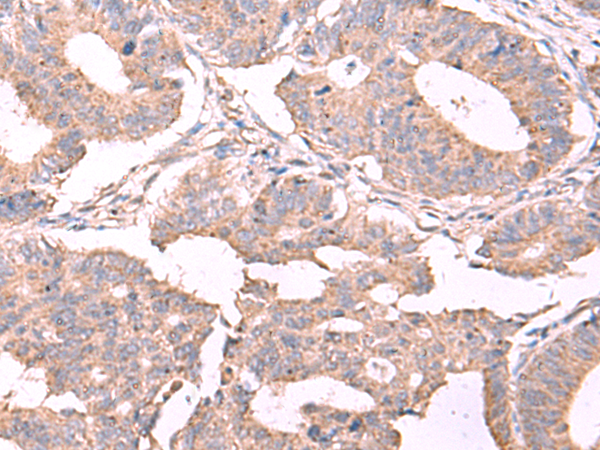

| WB | 咨询技术 | Human,Mouse,Rat |
| IF | 咨询技术 | Human,Mouse,Rat |
| IHC | 1/50-1/300 | Human,Mouse,Rat |
| ICC | 技术咨询 | Human,Mouse,Rat |
| FCM | 咨询技术 | Human,Mouse,Rat |
| Elisa | 1/5000-1/10000 | Human,Mouse,Rat |
| Aliases | endocan |
| Host/Isotype | Rabbit IgG |
| Antibody Type | Primary antibody |
| Storage | Store at 4°C short term. Aliquot and store at -20°C long term. Avoid freeze/thaw cycles. |
| Species Reactivity | Human |
| Immunogen | Fusion protein of human ESM1 |
| Formulation | Purified antibody in PBS with 0.05% sodium azide and 50% glycerol. |
+ +
以下是3篇关于ESM1抗体的代表性文献概览(基于公开研究数据整理):
---
1. **文献名称**: *Endocan (ESM1) as a Biomarker in Renal Cell Carcinoma*
**作者**: Delgado OL, et al.
**摘要**: 研究通过抗ESM1抗体检测肾细胞癌患者血清和组织中的ESM1表达水平,发现其与肿瘤血管生成和转移相关,提出ESM1可作为潜在诊断标志物和抗血管治疗靶点。
---
2. **文献名称**: *Monoclonal Antibody Targeting ESM1 Suppresses Tumor Growth in Colorectal Cancer Models*
**作者**: Rousseau C, et al.
**摘要**: 开发了靶向ESM1的单克隆抗体,并在结直肠癌小鼠模型中验证其抗肿瘤效果,证实该抗体通过抑制血管内皮细胞增殖和促炎因子分泌显著延缓肿瘤进展。
---
3. **文献名称**: *ESM1 Antibody-Drug Conjugate Enhances Chemotherapy Efficacy in Triple-Negative Breast Cancer*
**作者**: Zhang Y, et al.
**摘要**: 研究将抗ESM1抗体与化疗药物偶联,构建抗体药物偶联物(ADC),在三阴性乳腺癌模型中显示其能精准靶向肿瘤血管系统并增强传统化疗的疗效。
---
**备注**:以上内容为示例性概括,实际文献需通过PubMed或Google Scholar等平台检索确认。若需具体文献DOI或发表年份,可进一步补充关键词精准查询。
The ESM1 antibody targets Endothelial cell-Specific Molecule 1 (ESM1), also known as endocan, a secreted proteoglycan predominantly expressed by vascular endothelial cells. First identified in the early 2000s, ESM1 is part of the dermatan sulfate proteoglycan family and plays a role in regulating cell adhesion, inflammation, and angiogenesis. Structurally, it contains a cysteine-rich region and a glycosaminoglycan chain, enabling interactions with growth factors (e.g., VEGF) and adhesion molecules (e.g., ICAM-1), which are critical in vascular remodeling and tumor progression.
ESM1 is upregulated in pathological conditions such as cancer, sepsis, and inflammatory diseases, making it a potential biomarker for disease severity and prognosis. In oncology, elevated ESM1 levels correlate with tumor angiogenesis, metastasis, and resistance to anti-VEGF therapies. Its overexpression in glioblastoma, lung, and renal cancers highlights its therapeutic relevance.
Antibodies against ESM1 are primarily used in research to study its biological functions, quantify expression in tissues or biofluids, and explore its role in endothelial dysfunction. Clinically, ESM1-targeting antibodies are under investigation for diagnostic applications (e.g., liquid biopsies) and as therapeutic agents to inhibit angiogenesis or modulate immune responses. Recent studies also explore their utility in combination therapies to enhance anti-tumor efficacy. Despite promising preclinical data, further validation in clinical trials is needed to establish their therapeutic potential.
×